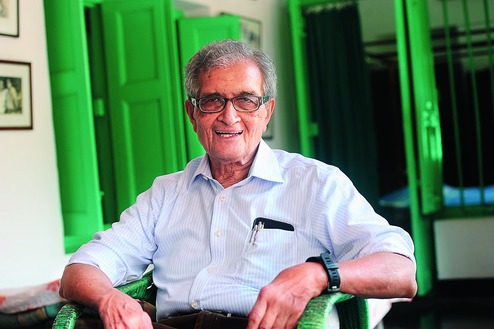
London, April 21: Sweden's prestigious Uppsala University, with which Rabindranath Tagore had close links, is set to honour Amartya Sen by awarding him its 2017 Johan Skytte Prize in Political Science, worth 500,000 Swedish krona or about Rs 36 lakh.
"The prize was overdue," Michal Smrek, information officer at the Skytte Foundation, told The Telegraph yesterday shortly after the announcement of Sen as the winner.
The citation acknowledged that a prize for political science was being given to an economist, but Smrek clarified that the judges had felt that Sen's work had profoundly influenced the study of political science.
"In every undergraduate course in political science his books are studied," Smrek said.
During his state visit to Sweden in June 2015, the first by an Indian President, Pranab Mukherjee had gone to Uppsala University and delivered a lecture, "Tagore and Gandhi: do they have contemporary relevance for global peace?"
Tagore, who won the Nobel for literature in 1913, the first non-European to do so, was feted at Uppsala during his first visit in 1921 and spoke in the same magnificent hall as Mukherjee. Tagore visited Sweden again in 1926.
In 2014, the university installed a bust of Tagore and signed an agreement with the Indian Council for Cultural Relations for a chair in Indian studies.
The Johan Skytte prize and medal will be awarded on September 30, starting with a solemn wreath-laying ceremony and music recital at the Uppsala Cathedral before moving to a more select gathering of 120 academics.
It is hoped that Sen would be able to attend and deliver a lecture that would be open to the public and held, in keeping with tradition, at the main university building.
Uppsala, which ranks among the 100 best universities in the world, was founded in 1477 with the Latin motto Gratiae veritas naturae (Truth through the grace of God and through nature).
It has about 44,000 registered students and 2,300 doctoral scholars, and 28 per cent of its 716 professors are women.
The chair of the six-strong judging panel that picked Sen is a woman - Li Bennich-Björkman, the Johan Skytte professor in political science and eloquence.
In 1622, Johan Skytte, then vice-chancellor of the university, made a generous donation and established the Johan Skytte chair in eloquence and government, which the citation described as "probably the world's oldest active professorship in political science".
"The lands included in the original donation continue to finance research and the Johan Skytte Prize," it added.
Although the prize, started in 1995, is meant to be open, all but three of the winners have been academics in America. The three exceptions have been from Germany and Italy. Sen is the first Indian winner.
"Amartya Sen, Thomas W. Lamont professor at Harvard University, wins the 23rd Johan Skytte Prize in Political Science," the citation said.
"Sen is awarded the prize for his multisided scholarship, combining insights on the vulnerabilities of humankind with knowledge on the unique capacities of democratic political power to mitigate and diminish this exposure."
The citation added that Sen, "who originates from West Bengal, has spent most of his professional career at (the) universities of Cambridge and Harvard".
It said that Sen had used the money from his 1998 Nobel for economics "to start the Pratichi Trust in India and Bangladesh that works to improve women's access to education and health care".
"Sen is an economist by training but his conviction that democratic institutions play a fundamental role in making a difference in people's lives makes him a worthy recipient of this highly esteemed prize in political science," the citation said.
"His notable scholarly works include Poverty and Famines (1981) where he explores the link between famine and lack of democracy and highlights the crucial role democracy plays in alleviating extreme poverty. In Development as Freedom (1999), he argues that political, social and economic freedoms are both the means and the ends of development.
"He sees development not only in one's material well-being but also one's ability to make free choices and act independently on them. In his 2009 book, The Idea of Justice, Sen addresses questions of how justice may be increased or how injustices may be removed, rather than offering resolutions of questions about the nature of perfect justice.
"Sen's contribution spans the fields of political economy, social choice theory, public health, political philosophy, as well as the sub-discipline of development studies."











